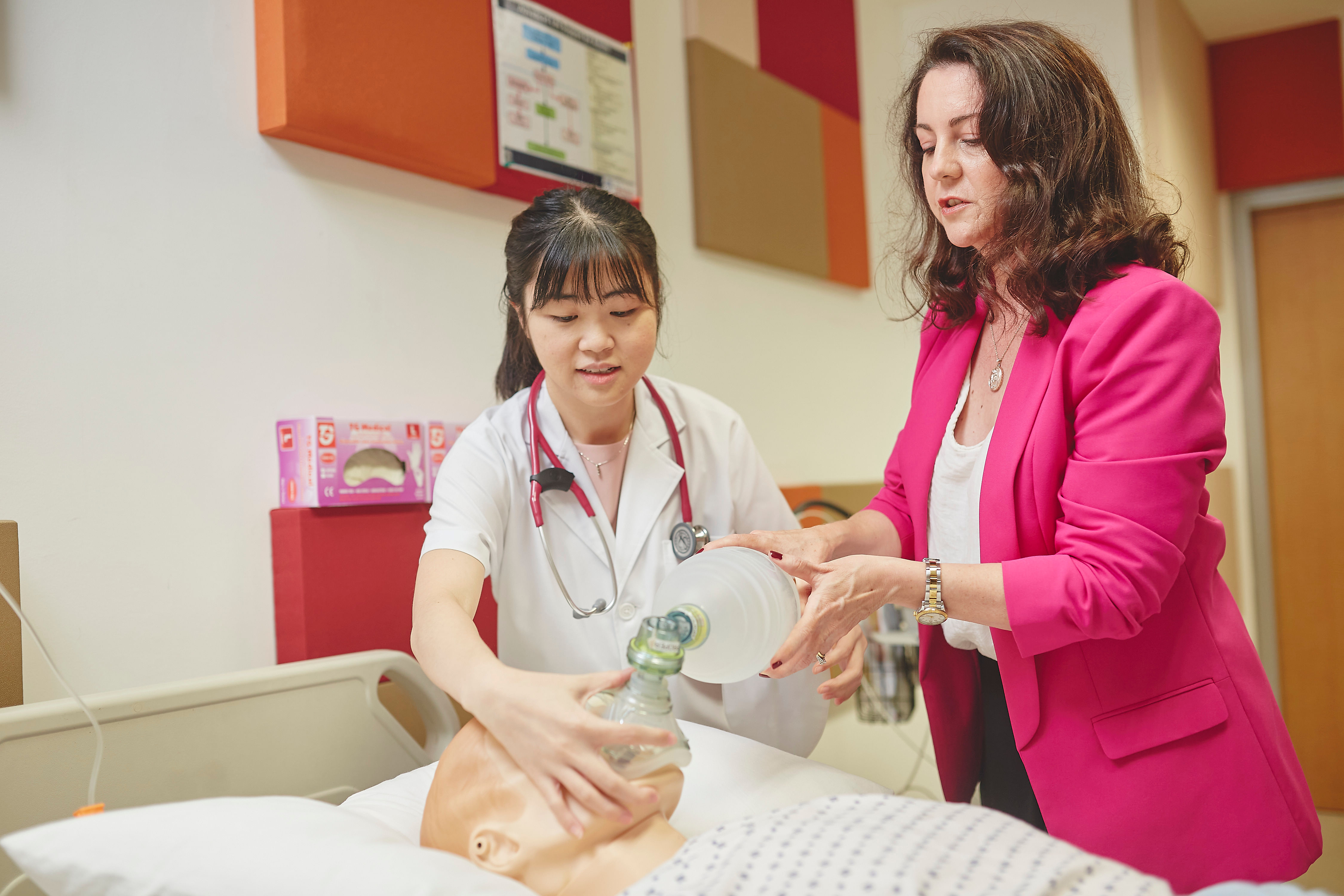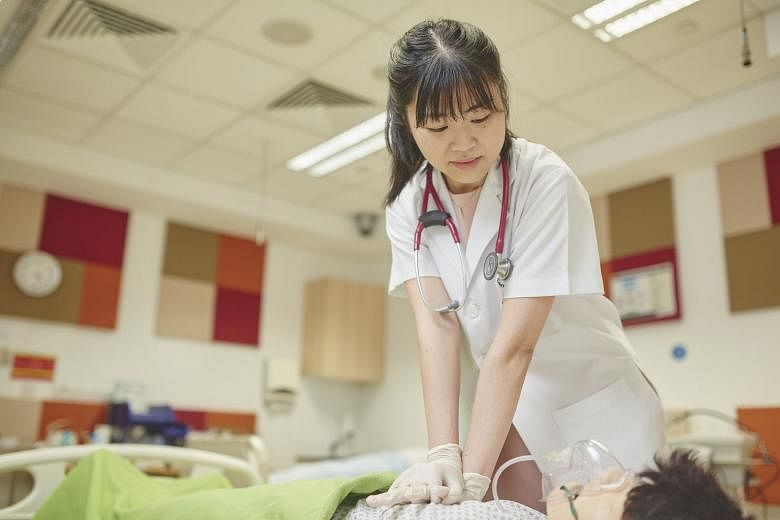For seven years, Ms Candy Tan was an up-and-coming chartered accountant, even receiving two top performer awards from Big Four firm Ernst & Young. However, in 2017, she decided to walk away from it all to go to medical school.
The final-year Duke-NUS Medical School student says she has lost count of the number of times people have asked her why she decided to make the drastic switch to a totally new specialisation.
The 32-year-old who has been volunteering as a first aider with St John Singapore since secondary school explains: "I never really saw it as a switch but rather a commitment to what I believe to be my calling. There wasn't a single experience that gave birth to the revelation that I wanted to pursue medicine, but it has always been a profession I gravitated towards because you know, what better way to do good?
"Medicine has come a long way but there are answers we still do not have and even more questions we have not asked. Therein lies its beauty, as what we can do for our patients is literally how much we want to push the boundaries."
A unique vision
The Duke-NUS' Doctor of Medicine (MD) programme has been welcoming applicants from diverse backgrounds - not just a pre-med or science background - since it was started in 2007.
The diversity of each cohort enables cross learning from diverse specialties and enriches the learning experience. While the majority of Duke-NUS' students come from a science background, about one quarter comes from engineering, and about 11 per cent come from arts and humanities, business studies and finance, and even law.
This adds valuable diversity into medical practice in Singapore, and introduces fresh perspectives on overcoming challenges in healthcare.
Professor London Lucien Ooi, Associate Dean (Admissions, Recruitment & Financial Aid) at Duke-NUS Medical School, explains that it has become important and relevant to the practice of medicine today as the provision of care for patients continues to evolve. With increased understanding of diseases and their management comes increasing complexity of care, especially with technological advances that have introduced new drugs, devices and machines like robotics and artificial intelligence.
Prof Ooi adds: "It is important for healthcare in general, that doctors continue to seek better ways of diagnosing and treating patients, and to also propagate improved care through leadership and education. To enable this, especially with the ever-changing advances in technology and healthcare, doctors need to be more than just clinicians, and become clinicians plus."
The school's pioneering Clinicians First, Clinicians Plus approach stems from its belief that graduates should be competent clinicians first, and beyond that, build on their other capabilities to become clinician scientists, innovators, educators and leaders to value-add to the Singapore healthcare system.

Ms Tan, for instance, worked with the National Heart Centre Singapore (NHCS) to trial a blood pressure lowering device for her third-year research project. There, she had the unique opportunity to plan and execute a clinical trial - from recruiting patients to performing the statistical analysis. Ms Tan's experience working in audit required her to liaise with multiple clients, each with their own practice and culture, and hence, different needs which she had to tailor to them. Recruiting patients for a clinical study called for a similar working ethic as every patient had their own ideas, concerns and expectations. Therefore, every pitch had to be customised in order to earn their trust and participation.
"I believe that acquiring this skill set (the ability to identify a problem in a system, coming up with a solution and a methodical way to test it) will serve me well in the future as research is vital in the advancement of medicine and improving patient care," Ms Tan says.
Overcoming the odds
With no pre-medical background, Ms Tan admits that her first year of medical school was especially gruelling. "I vividly remember how challenging the first basic science module 'Molecules, Cells and Tissues' was for me. Most of my classmates from science backgrounds breezed through it," she says.
However, she pulled through due to her dogged determination, as well as the strong support of Duke-NUS' close-knit community of peers, seniors, juniors and alumni. In the colleges, there are family or buddy systems and during the examination period, seniors and juniors come together to simulate mock examinations for the class. Seniors also selflessly put aside time from their busy curriculum to give juniors prep lectures and tutorials before their modules or clerkships in the hospital.
"Our seniors emulate the Clinician Plus role as an educator, nurturing us juniors to learn from their mistakes and become better clinicians. Now, we endeavour to pay it forward to our juniors too," Ms Tan says.
While accountancy seems like a completely unrelated field, Ms Tan says her work experience taught her to work well in a team. Being in audit also primed her to have an eye for detail which is important as a clinician. As a doctor, she will also have to find and gather clues, from talking to the patient, to examining the patient, to looking at laboratory test results, to come to a diagnosis.
In fact, Ms Tan finds her previous working experience in audit strikingly similar to what she does on a daily basis in the hospital wards. "As an auditor, companies employ us and give us access to confidential documents where we scrutinise the transactions, ask difficult questions and come up with solutions. Similarly, patients come to us with a presenting complaint and allow themselves to be vulnerable by letting us clinicians ask sensitive questions and examine their bodies, in the trust that we will guard their secrets and help them at the same time.
"Having worked in audit for several years, I have learnt to adapt quickly to different situations and communicate effectively to establish good rapport which I believe has served me well in being a competent Clinician First."
Ultimately, Ms Tan aspires to be the kind of doctor you would want your loved ones, if need be, to go to. She adds: "To earn the trust of a complete stranger and accessing their lives and examining their bodies is a privilege. And I intend on honouring that by helping patients one at a time.
"I may not change the world but the knowledge that I have touched a person's life is good enough for me."
Click here to register for the Duke-NUS Medical School e-Open House happening on April 24, 2021.


